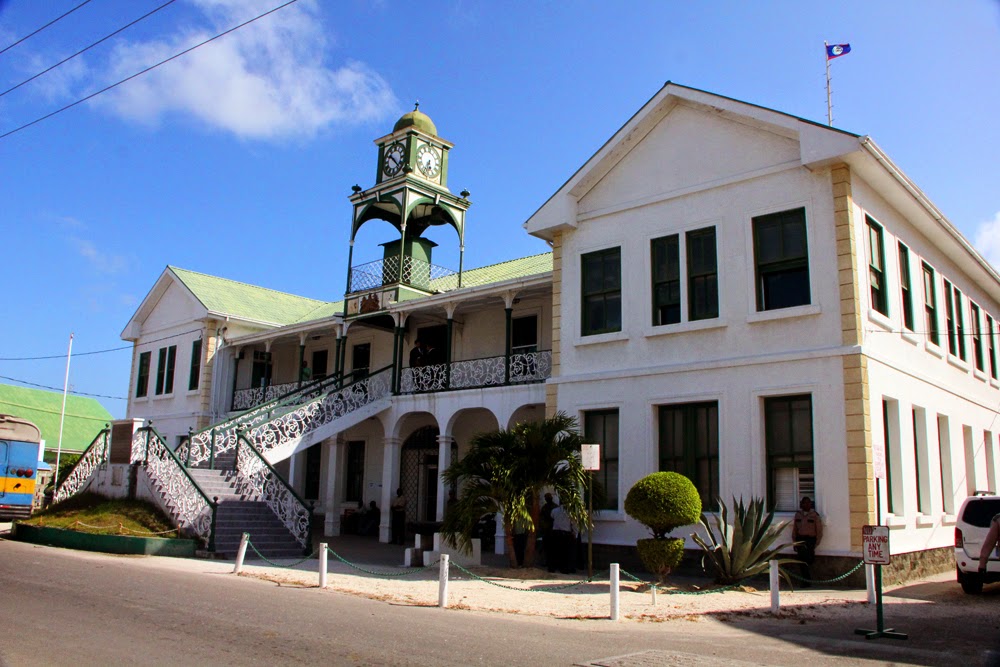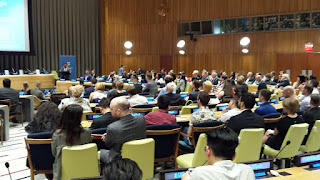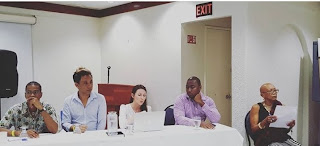The Nazification of Caribbean Leaders: Chucking Citizens dignity and Rights out the door.
28th, April, 2015
At the Parliamentary Assembly of the African, Caribbean and Pacific (ACP) Group of States, meeting at its 35th Session in Strasbourg, France on 14 and 19 March 2014, leaders supported a declaration against the suspension of Nigeria and Uganda from negotiations of the Cotonou Agreement for its criminalisation of own L.G.B.T citizens A declaration which spoke of 'that democracy and human rights do not allow forceful imposition of unilateral points of view by one country over another sovereign country;' and goes on to say,'the laws passed in Uganda and Nigeria were proposed by democratically elected Parliaments, and complied with all the necessary legislative procedures, including consultations with a cross-section of their populations;' lost on me is how the rights and dignity of citizens can be subsumed by sovereignty rights. The declaration goes to speak of, 'its rejection of any attempt to pressure the ACP countries into accepting values contrary to the wishes and aspirations of their peoples'
At the Parliamentary Assembly of the African, Caribbean and Pacific (ACP) Group of States, meeting at its 35th Session in Strasbourg, France on 14 and 19 March 2014, leaders supported a declaration against the suspension of Nigeria and Uganda from negotiations of the Cotonou Agreement for its criminalisation of own L.G.B.T citizens A declaration which spoke of 'that democracy and human rights do not allow forceful imposition of unilateral points of view by one country over another sovereign country;' and goes on to say,'the laws passed in Uganda and Nigeria were proposed by democratically elected Parliaments, and complied with all the necessary legislative procedures, including consultations with a cross-section of their populations;' lost on me is how the rights and dignity of citizens can be subsumed by sovereignty rights. The declaration goes to speak of, 'its rejection of any attempt to pressure the ACP countries into accepting values contrary to the wishes and aspirations of their peoples'
In August, 2014. the Ugandan court said in its ruling,"The speaker was obliged to ensure that there was quorum" . "We come to the conclusion that she acted illegally." The essence of the law as reported by the Guardian said in December, 2013, 'The bill, rushed through by MPs on Friday, also bans the promotion of homosexuality and makes it a crime punishable by prison not to report gay people to the authorities or to conduct a marriage ceremony for same-sex couples.' The Bill was tabled without notice, but the declaration from A.C.P states would lead us to believe that it was,'the laws passed in Uganda and Nigeria were proposed by democratically elected Parliaments, and complied with all the necessary legislative procedures, including consultations with a cross-section of their populations.' It seems the region leaders in the Caribbean would vote to support the Nazis in their quests to get rid of Jews, under the claims of Sovereign Rights. More importantly, spoke of a,' ..forceful imposition of unilateral points of view.'
But what happens when a national court offers an interpretation of a country constitutional frameworks. The declaration totally ignored, the 2011, Ugandan ruling on rolling stone, the 2013 ruling of Audrey Mbugna Ithiba, of 2013. The rolling stones ruling in January, 2011, about four years before the declaration point out the following:
In considering whether the Rolling Stone’s publication of alleged homosexuals’ names, addresses and preferred social hang-outs constituted a violation of the applicant’s constitutional rights, the Court, ruled that:
1) The motion is not about homosexuality per se, but ‘...it is about fundamental rights and freedoms,’ in particular about whether ‘the publication infringed the rights of the applicants or threatened to do so’.
2) The jurisdiction of Article 50 (1) of the Constitution is dual in nature, in that it extends not just to any person ‘whose fundamental rights or other rights or freedoms have been infringed in the first place,’ but also to ‘persons whose fundamental rights or other rights or freedoms are threatened to be infringed.’
3) Inciting people to hang homosexuals is an attack on the right to dignity of those thus threatened: ‘the call to hang gays in dozens tends to tremendously threaten their right to human dignity.’
4) Homosexuals are as entitled to the right to privacy as any other citizens. Against the ‘objective test’, ‘the exposure of the identities of the persons and homes of the applicants for the purposes of fighting gayism and the activities of gays...threaten the rights of the applicants to privacy of the person and their homes.....’
The court further awarded UGX. 1,500,000/= to each of the applicants, as well as ordering that the applicant shall recover their costs from the respondents. The court issued a permanent injunction preventing The Rolling Stone and their managing editor, Mr. Giles Muhame, from ‘any further publications of the identities of the persons and homes of the applicants and homosexuals generally.’
While politicians are not always lawyers, it is clear that parliamentarians do no follow legal precedence and are challenged to improve their basic understanding of international and national legal obligations. If they did, this badly worded declaration would have reflected the rights of citizens in the overall statement. In addition to the Rolling Stones case, the case of Audrey Mbugua Ithibu, further adds, not only national values, but national interpretation of fundamental rights.
In a case brought by Audrey Mbugua Ithibu, who was seeking to have her name, replaced on documents issued by the Kenya National Examination Council certifying she had passed educational exams ruled, The court said,
“The court takes judicial notice of the fact that examinations in this country are not administered based on the gender of the candidate. Marks are also not awarded based on gender. Removal of the gender mark will therefore not dilute the quality of the certificate,” Korir reportedly said.
Furthermore, the positive ruling on the Kenya, National Gay and Lesbian Human Rights Commission, (NGLHRC) reported April, 27th, 2015 on buzzfeed, showed that the EU position to suspend both countries from the Cotonou agreement, was an accurate reflection of legal obligations to uphold basic human rights concerns. This seem to have been lost on the crafters of the declaration.
See below:
3rd January, 2011
Court Ruling on 'Hang Them' Tabliod
http://www.boxturtlebulletin.com/2011/01/03/28820
Non-Discrimination and Development
http://www.europa-nu.nl/id/vizt49q9tfyw/agenda/non_discrimination_and_development_event?ctx=vgu719bwymmc
20th, December, 2013
Ugandan MP's Rush through draconion Law Against homosexuality.
http://www.theguardian.com/world/2013/dec/20/uganda-mps-laws-homosexuality
1st August, 2014
Law Declared null and void
http://www.theguardian.com/world/2014/aug/01/uganda-anti-gay-law-null-and-void
8th October, 2014
Court Defends Trans Rights
http://www.buzzfeed.com/lesterfeder/kenyan-court-defends-trans-rights-in-new-ruling#.whkMpYeyn
In considering whether the Rolling Stone’s publication of alleged homosexuals’ names, addresses and preferred social hang-outs constituted a violation of the applicant’s constitutional rights, the Court, ruled that:
1) The motion is not about homosexuality per se, but ‘...it is about fundamental rights and freedoms,’ in particular about whether ‘the publication infringed the rights of the applicants or threatened to do so’.
2) The jurisdiction of Article 50 (1) of the Constitution is dual in nature, in that it extends not just to any person ‘whose fundamental rights or other rights or freedoms have been infringed in the first place,’ but also to ‘persons whose fundamental rights or other rights or freedoms are threatened to be infringed.’
3) Inciting people to hang homosexuals is an attack on the right to dignity of those thus threatened: ‘the call to hang gays in dozens tends to tremendously threaten their right to human dignity.’
4) Homosexuals are as entitled to the right to privacy as any other citizens. Against the ‘objective test’, ‘the exposure of the identities of the persons and homes of the applicants for the purposes of fighting gayism and the activities of gays...threaten the rights of the applicants to privacy of the person and their homes.....’
The court further awarded UGX. 1,500,000/= to each of the applicants, as well as ordering that the applicant shall recover their costs from the respondents. The court issued a permanent injunction preventing The Rolling Stone and their managing editor, Mr. Giles Muhame, from ‘any further publications of the identities of the persons and homes of the applicants and homosexuals generally.’
While politicians are not always lawyers, it is clear that parliamentarians do no follow legal precedence and are challenged to improve their basic understanding of international and national legal obligations. If they did, this badly worded declaration would have reflected the rights of citizens in the overall statement. In addition to the Rolling Stones case, the case of Audrey Mbugua Ithibu, further adds, not only national values, but national interpretation of fundamental rights.
In a case brought by Audrey Mbugua Ithibu, who was seeking to have her name, replaced on documents issued by the Kenya National Examination Council certifying she had passed educational exams ruled, The court said,
“The court takes judicial notice of the fact that examinations in this country are not administered based on the gender of the candidate. Marks are also not awarded based on gender. Removal of the gender mark will therefore not dilute the quality of the certificate,” Korir reportedly said.
In addition to this ruling, the Kenyan court ruled in the case of G v Odunga, case 308A of 2013. The court ruled, ' Apart from the foregoing, it is my view that to discriminate persons and deny them freedom of association on the basis of gender or sex is clearly unconstitutional. That would contravene the provisions of Article 27(4)of the Constitution which provides that;The State shall not discriminate directly or indirectly against any person on any ground, including race, sex, pregnancy, marital status, health status, ethnic or social origin, colour, age, disability, religion, conscience,belief, culture, dress, language or birth.'
Furthermore, the positive ruling on the Kenya, National Gay and Lesbian Human Rights Commission, (NGLHRC) reported April, 27th, 2015 on buzzfeed, showed that the EU position to suspend both countries from the Cotonou agreement, was an accurate reflection of legal obligations to uphold basic human rights concerns. This seem to have been lost on the crafters of the declaration.
That states find sovereign rights, more important, than their national legal obligations to protect their L.G.B.T citizens, begs the question. If not them, then who is to protect their citizens? More importantly, the recent legal decision in the NGLHRC ruling cements the point that nations, including Caribbean nations are already legally obligated to their L.G.B.T citizens.The Kenyan judge decisions support such a premise in the following way, “An interpretation of non-discrimination which excludes people based on their sexual orientation would be in conflict with the principles of human dignity, inclusiveness, equality, human rights, and non-discrimination” the three judge panel held in a portion of their ruling interpreting three sections of the Kenyan constitution concerning fundamental rights. Even in Tomlinson v TJL, CVM Ltd and the Public broadcasting of Jamaica the court acknowledged, "(28) it is perhaps to be recognised that the claimant cannot seek redress for any allegations of discrimination on the grounds of his sexual orientation as the charter does not afford that protection specifically. This maybe viewed as a significant deficiency in this charter, but it is to be noted that the first paragraph of the charter is comprehensive enough to point to a view that it be interpreted to embrace all the rights and responsibilities of all Jamaicans." The shameful language of ACP states in the declaration, suggest that state value complicity in the violation of and subsuming of citizens rights, in the name of Sovereign Rights.
Seshauna writes in a piece called Maurice Tomlison verse Television Jamaica Ltd..., "The corresponding horizontality section of the South African Constitution has been said to embrace a conception of liberalism which recognizes that ‘the real issue regarding the application of fundamental rights is …about how all kinds of power are distributed throughout a polity and what that means for the lives of individuals and the associations that inhabit the larger political community.’ Despite repeated references to the South African provision and the suggestion that it was conceived in an ethos of equality, the Jamaican Court did not take sufficient notice of the context of power distribution that arose in the case before it."
The declaration and Seshuna writing implies that protection and enforcement of rights is about power distribution. The implication is that distribution can either cause harm or be supportive depending on the views of the L.G.B.T communities among CariCOM member states, or state leaders who are generally complicit by indifference, inaction and omission to uphold oppressive social and institutionalised systems that perpetuate mistreatment and violence against their own L.G.B.T citizens. Furthermore when the St. Lucia Foreign Minister Alva Bapiste will show up at an event on Non-discrimination and Development, in Brussels in 2012 and call it, privately, 'a trick,' while leaders fail to endorse a roadmap on discrimination because 140 religious groups, sent a statement about the roadmap,'reordering society,' speaks volumes to the commitment of regional leaders to the fundamental rights of its L.G.B.T citizens. More importantly, reflected how current social power distributions between the religious extremists and marginalise can be set aside for political convenience, instead of leadership and responding to legal obligations.
The Nazification of the region, is not about genocide, but about states refusal to invest in legislation and mechanism that directly extents protections and rights enforcement base on sexual orientation and gender identity; setting up systems that address discrimination; invest in interventions that builds the capacity of the justice system to respond to issues base on sexual orientation and gender identity. Leaving the responsibility of rights defence and protection solely to the individual affected while keeping policies and practices that act as barriers to advance social and cultural transformation, does not uphold human dignity. In addition, a failure of any cabinet to take a formal positions as state, policy in what its fiduciary responsibility is to its L.G.B.T citizens, is at minimum, dubious. Either way, state refusal to deal with its L.G.B.T citizens cost lives ,erodes human dignity and promotes exclusion.
Belize, has made some strides through its Gender Policy, it however, does not have an official state position on its L.G.B.T citizens; its investment in rights remain minimal and cabinet leaders specific commitment, to its legal responsibility towards its L.G.B.T citizens remain ambiguous, at best. The Nazification of Belize, is as issue of inequitable distribution of social power, a failure to lead and distorted privileged realities. The solution it seems is the use of National Supreme Courts to correct, systemic oppression to construct systems of support to advance dignity and rights. He who feels it, knows it and will do something about it, seems to be the order of the day.
See below:
3rd January, 2011
Court Ruling on 'Hang Them' Tabliod
http://www.boxturtlebulletin.com/2011/01/03/28820
Non-Discrimination and Development
http://www.europa-nu.nl/id/vizt49q9tfyw/agenda/non_discrimination_and_development_event?ctx=vgu719bwymmc
20th, December, 2013
Ugandan MP's Rush through draconion Law Against homosexuality.
http://www.theguardian.com/world/2013/dec/20/uganda-mps-laws-homosexuality
1st August, 2014
Law Declared null and void
http://www.theguardian.com/world/2014/aug/01/uganda-anti-gay-law-null-and-void
8th October, 2014
Court Defends Trans Rights
http://www.buzzfeed.com/lesterfeder/kenyan-court-defends-trans-rights-in-new-ruling#.whkMpYeyn
Ruling of GvOdunga
LGBT Rights Victory Kenya on NGLHRC







Comments
Post a Comment